Campaigning in Iowa, Mitt Romney publicly re-states his pro-homosexual positions on military, judges, and more.
An unsettling glimpse into a Romney Administration . . .
As
the campaigning for the Iowa caucuses on January 3 heats up, Mitt
Romney has publicly — and rather shockingly — restated his support for
many of the homosexual movement's goals. These recent statements, while
fairly shocking, certainly square with his actions as Governor of
Massachusetts, which we have documented.
They differ sharply from the hardcore "social conservative" façade he
presented when he ran for president in 2008. He did his best to disguise
his radical viewpoint on "sexual orientation" record then.
But Romney was candid about his pro-gay positions
during the national televised candidates' debate in Iowa on Thursday,
Dec. 15 and also during a newspaper editorial board meeting on Dec. 9.
|
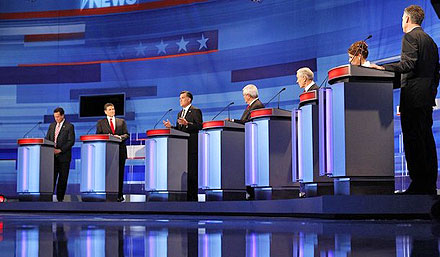 At
national Fox News debate in Iowa on Dec. 15. From left: Rick Santorum,
Rick Perry, Mitt Romney, Newt Gingrich, Ron Paul, Michele Bachmann, and
Jon Huntsman. At
national Fox News debate in Iowa on Dec. 15. From left: Rick Santorum,
Rick Perry, Mitt Romney, Newt Gingrich, Ron Paul, Michele Bachmann, and
Jon Huntsman.
|
Romney emphasized that the one exception
to his pro-gay positions is regarding marriage. He said he always did
everything possible to fight against same-sex "marriage." But even that
claim has serious problems.
These positions certainly make Romney
in the minority among the Republican presidential candidates, and would
make him the most pro-homosexual Republican presidential nominee ever
were he to get the nomination. And they should be a pretty clear window
into what a Romney Administration would be like regarding this issue.
In particular, Romney discussed his positions on:
(1) Support for gays in the military
On Dec. 9, Mitt Romney met with the editorial board of the Des Moines Register, Iowa's major newspaper. Here is what he said (see video) regarding this issue:
Reporter: How do you feel about gays serving openly in the military?
Romney: That's already occurred. I'm not planning on reversing that at this stage.
Reporter: But you're comfortable with it?
Romney:
I was not comfortable with making the change during a period of
conflict, by virtue of the complicating features of a new program in the
middle of two wars going on. But those wars are winding down. And
moving to that direction at this stage no longer presents that problem.
In
December 2010, in a cowardly lame-duck session, the Democrat-controlled
US House and Senate pushed through a repeal of "Don't Ask Don't Tell,"
effectively homosexualizing the US military. The margin of victory was
by liberal legislators who had already lost their re-elections the
previous month. They knew it would never have passed after January 1,
2011 when the new Congress came in. It was greeted with universal
outrage in the conservative movement.
|
|
Romney speaks to editorial board of the Des Moines Register. See video here.
|
So, Romney supports the repeal of Don't Ask Don't Tell. His only issue was making the change during wartime.
He
had been vague on this issue throughout the campaign four years ago.
But in 1994 while running against Ted Kennedy for US Senate, he said in
his infamous letter to the homosexual group Log Cabin Republicans that
open service for homosexuals in the military was a goal he agreed with.
(See link to letter below.)
(2) Romney's strong support for "gay rights" in society
During the debate, Moderator Chris Wallace asked Romney about his 1994 pledge to the homosexual lobby that he would aggressively "seek full equality" for homosexuals. [See his letter to the Log Cabin Republicans here.]
"In
1994, when you were running for the Senate, you wrote a letter to the
Log Cabin Republicans in which you said, "I am more convinced than ever
before that, as we seek full equality for America's gay and lesbian
citizens, I will provide more effective leadership than my opponent,"
who was Ted Kennedy. . . So you are still more of a champion of gay
rights than Ted Kennedy was?"
Romney replied:
"Let
me go back and say that. I do not believe in discriminating against
people based upon their sexual orientation. There are some people that
do . . . I believe as a Republican, I had the potential to fight for
antidiscrimination in a way that would be even better than Senator
Kennedy, as a Democrat, was expected to do so."
As
we all painfully know, "full equality" and "anti-discrimination" when
used with "sexual orientation" are code words for forcing everyone in
society under penalty of law to accept homosexual (and transgender)
behavior into their lives as normal, subverting their moral and
religious beliefs.
During Romney's term as Governor, this was particularly manifested in the public schools,
where Romney's "Governor's Commission for Gay and Lesbian Youth" was
well-funded, had access in the schools, and put on an annual "Youth
Pride Parade" and "gay/transgender" prom in Boston. On two occasions
(2003 and 2004) Romney signed proclamations for "Gay Youth Appreciation
Day" to coincide with those events.
|
|
While Romney was governor, most people weren't aware that their tax dollars were supporting homosexual "Youth Pride" events.
This 2005 parade was led by "transgender warrior" Leslie Feinberg (in dark jacket on left of banner).
[Mass-Resistance photo]
|
Romney's moral position on homosexuality: it's not immoral
As Amy Contrada points out in her book The Mitt Romney Deception, the best key to understanding Romney's moral position on homosexuality may be his condemnation of Joint Chiefs of Staff Chairman, General Peter Pace. In March 2007, Pace committed the politically incorrect sin of saying that homosexuality is immoral. Romney said in response:
"I
think General Pace has said that he regrets having said that, and I
think he was wise to have issued an apology, or a withdrawal of that
comment. I think that we, as a society, welcome people of all
differences, whether there are differences in ethnicity, faith, or
sexual preference, and I think he was wise to correct his comment and to
suggest that was an inappropriate point to have made."
In other words, it's not a problem. It's just a "sexual preference" that we need to learn to tolerate.
(3) Willing to appoint homosexual [activist] judges
Romney has strongly indicated that he does not believe that homosexuality is a moral issue and not a concern even when appointing judges.
During the debate Romney said:
"I
do not believe in discriminating against people based upon their sexual
orientation . . . I didn't ask justices that I was looking to appoint .
. . what their sexual orientation was."
We saw that first hand in Massachusetts when Romney was Governor.
One of Romney's known homosexual judge appointees was Stephen Abany
(in May 2005) to district court. Abany was an activist for gay-rights
causes. He was a board member of the Massachusetts Lesbian and Gay Bar
Association which heavily advocated for homosexual "marriage." Abany
also had testified at the State House in 1999 advocating repeal of the
Massachusetts law criminalizing sodomy. Such activism and glaring
opposition to Romney's stated support for traditional marriage
apparently did not keep him from making this appointment.
|
|
At 2010 Massachusetts Gay and Lesbian Bar Association fundraiser. From right: Judge Stephen Abany, gay activist lawyer Gary Buseck, Dinner co-chairman Richard Moore.
|
Another Romney district court appointee was Marianne C. Hinkle.
Hinkle is a Democrat who worked as an aide to Governor Michael S.
Dukakis in the late 1970s and prosecuted John C. Salvi III in the 1994
Brookline abortion clinic shootings. Hinkle, in her application for the
bench, describes herself as a longtime active member of Dignity/USA, a
group that advocates for expanded gay rights in the Catholic Church and
in society.
While in office, Romney created a Judicial Nominating Commission to help find people for him to nominate as judges. The state lesbian and gay bar association was given a seat on that committee, and its members encouraged to apply for judgeships. (See Amy Contrada's new article on "Romney's Judicial & Legal Appointments.")
In
our experience every judge (and every politician) who publically "outs"
himself as a homosexual is also an emotional, active advocate for the
homosexual movement's political goals. This includes "gay marriage" and
support for homosexual-transgender programs in the schools. We've seen
this over and over again. That's why the homosexual lobby goes to such
lengths to get homosexuals appointed as judges and elected as public
officials.
Romney apparently doesn't get it. In this regard he could be particularly dangerous for the pro-family movement.
Romney's 'Governor's Council' excuse. At
one point during the debate, Romney said that as Governor he only
"nominated" judges, and the Democrat-dominated elected Governor's
Council actually approved them, so he needed to nominate judges who
would pass muster with the Governor's Council. In theory that's true.
But in fact the Governor's Council always acts as a rubber stamp and
very rarely rejects a judge's nomination for any reason whatsoever. It's
a disingenuous argument.
(4) Touting pro-homosexual/transgender daycare center as "success story"
Twice during the debate Romney mentioned Bright Horizons Children's Centers as one of his businesses successes. Sounds good, until you dig deeper (as MassResistance researcher Amy Contrada recently did).
To
social conservatives, Bright Horizons, a national day-care provider, is
a huge red flag. Like Bain Capital, Romney's old company, Bright
Horizons has earned a 100% rating with the Human Rights Campaign (HRC), a national homosexual advocacy organization.
|
|
What does a 100% HRC rating mean?
- Company must give full transgender benefits, including hormone treatments, cosmetic, and even surgical procedures.
- Company must have domestic partner benefits and full "sexual orientation" and "gender identity" equal opportunity policies.
- Company
cannot donate any money to, or have any financial relationship with,
pro-family groups, or in the case of law firms, give them legal advice.
- And MUCH more.
Bright
Horizons describes its commitment to diversity to include, among other
things, celebrating the value of all "sexual orientations, family
structures and genders."
It's troubling, to say the least,
that Romney would have no problem with all this. Is he not even
bothered by the obvious possibility of transgender teachers at day care
centers? What does that say about how a President Romney would run the
federal government?
(5) Romney on "gay marriage": yes and no.
During the debate, Romney said emphatically: "I oppose same-sex marriage. That's been my position from the beginning."
But Romney's definition only extends to the word "marriage." He
supports state-sanctioned same-sex marriage-like relationships, even
involving children.
Refused to support strong marriage amendment: In 2001-2002 — before the Goodridge
"same-sex marriage" decision (Nov. 2003) — a strong petition referendum
for a pro-marriage constitutional amendment was put forth by
Massachusetts Citizens for Marriage (MCM).
The 2001 MCM constitutional amendment read:
Only
the union of one man and one woman shall be valid or recognized as a
marriage in Massachusetts. Any other relationship shall not be
recognized as a marriage or its legal equivalent, nor shall it receive
the benefits or incidents exclusive to marriage from the Commonwealth,
its agencies, departments, authorities, commissions, offices, officials
and political subdivisions. Nothing herein shall be construed to effect
an impairment of a contract in existence as of the effective date of
this amendment.
A candidate for Governor at the time, Mitt Romney refused to sign it. As the Boston Globe reported, Romney said it was "too extreme." This was despite the fact that his wife, son, and daughter-in-law had signed it.
As the Globe reported in the article (3/22/2002):
Eric
Fehrnstrom, a Romney campaign spokesman, said Romney opposes gay
marriage but also opposes the amendment, since he sees no reason to
change the current laws, which allow for domestic-partner benefits to
public employees. Currently, state employees' partners get limited
benefits, but no health benefits.
Romney's family members signed
the petition to put it on the ballot "without reading the fine print,"
Fehrnstrom said, but he has no reason to believe they do not support it.
"Mitt
did not know they signed it, and Mitt does not support it," he said.
"As far as Mitt is concerned, it goes farther than current law, and
therefore it's unnecessary."
In
refusing to sign it, Romney was out of step with the overwhelming
conservative movement in Massachusetts. The amendment required 56,100
certified signatures to go to the Legislature. Over 100,000 people signed it, and 76,000 of those were certified.
Unfortunately, when it got to the Legislature, the Senate President Tom
Birmingham refused to allow a vote on it. The Supreme Judicial Court
later ruled that Birmingham had acted illegally, but said that they
couldn't force him to follow the Constitution and hold a vote.
Supported civil unions.
After the Goodridge same-sex "marriage" court decision, Romney
supported a constitutional amendment written by the Legislature, the "Travaglini-Lees Amendment,"
which would have created marriage-like civil unions in the Constitution
with complete legal equivalence to marriage. (That amendment eventually
died.)
Supported domestic partnerships. Later, in
2005, when another marriage amendment which was not as restrictive had
emerged as a referendum initiative, Romney told a State House press conference that if the amendment were to pass, he would support domestic partnership legislation for homosexuals.
As Romney said at the press conference:
"There
will be children born to same-sex couples, and adopted by same-sex
couples, and I believe that there should be rights and privileges
associated with those unions and with the children that are part of
those unions."
|
|
July 2004: Man-on-the-street reaction to "gay marriage" ruling in Massachusetts.
[MassResistance photo]
|
(6) Romney re-intreprets the Massachusetts Constitution on marriage
During the Dec. 15 debate, Rick Santorum challenged Romney
about how he fatally mishandled the "gay marriage" ruling in 2003 and
began issuing same-sex marriage licenses the following year — and
ordering justices of the peace to perform them if asked — without any
legal authority or directive from a court or the Legislature.
Santorum said:
"Governor Romney — the
court then gave the legislature a certain amount of time to change the
law. They did not. So Governor Romney was faced with a choice: Go along
with the court, or go along with the constitution and the statute. He
chose the court and ordered people to issue gay marriage licenses, and
went beyond that. He personally as governor issued gay marriage
licenses. I don't think that is an accurate representation of his
position of saying tolerance versus substantively changes in the laws."
Romney answered:
"That
is a very novel understanding of what our Supreme Court of
Massachusetts did. I think everybody in Massachusetts and the legal
profession in Massachusetts and my legal counsel indicated that the
Supreme Court of Massachusetts determined that under our constitution,
same-sex marriage was required. And the idea that somehow that was up to
me to make a choice as to whether we had it or not is a little unusual.
We got together with our legislature and I fought leading an effort to
put in place a constitutional amendment in Massachusetts to overturn the
court's decision to make marriage as a relationship between a man and a
woman."
Actually, there were widespread calls from the conservative legal community across the country for Romney to ignore the judges' ruling, since Constitutionally it could only possibly
apply to that particular case, and only the Governor and Legislature
can deal with marriage issues. The Constitution also states that only
the Legislature can make or suspend laws, and the Massachusetts marriage
law then (and now) clearly states marriage is between a man and a
woman. (Even the Court acknowledged it couldn't change the law.)
An excellent analysis of this and the exchange between Romney and Santorum can be found on Steve Deace's blog in Iowa. Steve Deace is a longtime political commentator in Iowa as well as a major radio talk show host. Deace reports that after the debate Romney issued a challenge
that Santorum wouldn't be able to find any respected legal authorities
that would agree with his characterization of Romney's culpability.
Deace went right to work on that! (Besides, Amy Contrada's book, Mitt Romney's Deception, already included well- documented expert legal analysis.)
Moreover, Romney's legal counsel at the time of the ruling, Daniel Winslow,
was a pro-gay advocate who supported "gay marriage". As a reward for
work persuading Romney to move forward on that issue, Winslow was
subsequently enthusiastically endorsed by the homosexual lobby when he
ran for State Legislature in 2010.
As we said, all of this gives a view of what a Romney Administration would be like from a traditional values perspective. |

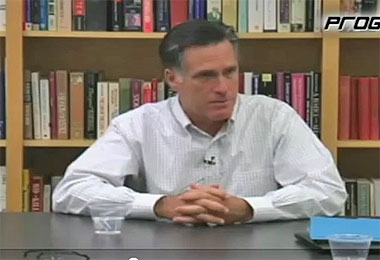
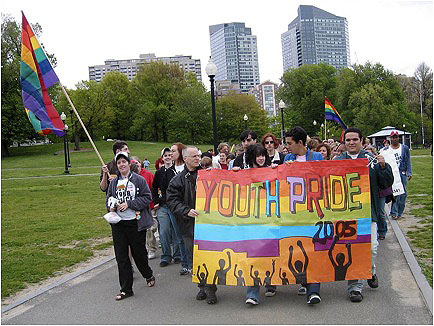
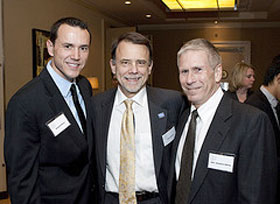

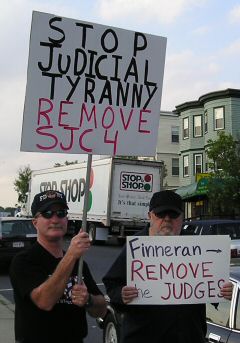
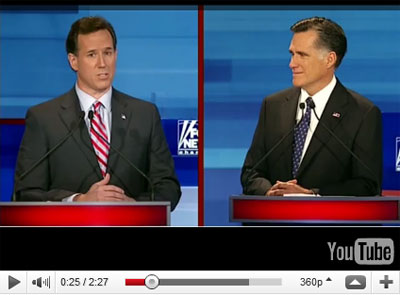
No comments:
Post a Comment